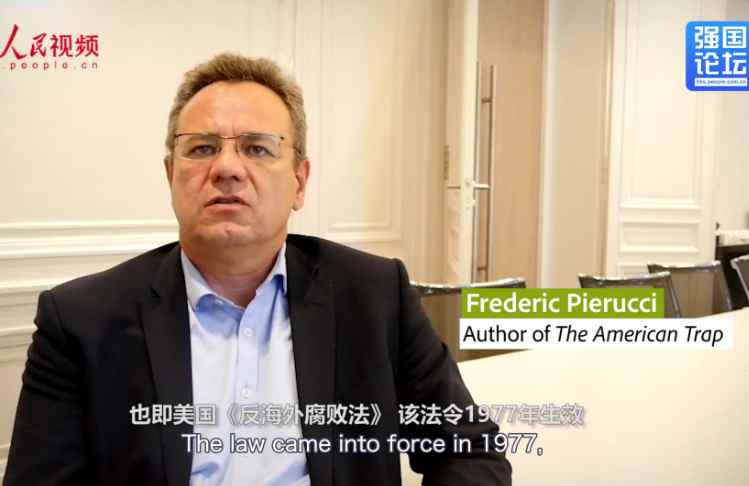

Editor's note: According to CNN, the US Department of Justice on Wednesday asked a judge to dismiss the Huawei lawsuit, which led to heated discussion on the separation of powers and judicial independence of American politics. Frederic Pierucci, former executive of French rail transport company Alstom, detailed a similar story in his book The American Trap. In a recent exclusive interview with People’s Daily Online, Frederic recalled his own experience with the long-arm jurisdiction of the U.S. and his subsequent battle.

On April 14, 2013, Frederic Pierucci, an executive of Alstom, a French power and transportation conglomerate, was arrested by the FBI when his plane arrived at New York's John F. Kennedy International Airport. He was charged with bribing Indonesian officials to win a power plant contract.
But the indictment was not a simple anti-corruption probe, as Pierucci, then president of the French power titan's boiler subsidiary, argued in his book The American Trap, where he unveiled how the U.S. law enforcement departments used its anti-corruption laws to pursue anti-corruption investigations into non-U.S. companies worldwide.
The “America trap” was set for non-U.S. countries, enterprises and individuals, Pierucci said, adding that any international company targeted by the U.S. justice department could not escape the intervention of the U.S. anti-corruption laws.
Step by step, the U.S. government is taking control of the core industries and highly competitive companies of other countries.
The Foreign Corrupt Practices Act (FCPA) came into force in 1977. It was meant to punish American companies involved in overseas bribery. But the Americans re-adopted the act and gave it extraterritoriality.
The FCPA had brought in penalties of more than 10 billion euros for the U.S. since 2005. Of the penalties, 60 percent were from European companies, while only 15 percent were from American companies.
The FCPA has caused French companies to pay $14 billion to the U.S. government. While in prison, Pierucci did a lot of research and concluded that most of the defendants would plead guilty and cooperated with U.S. law enforcement departments even though there was no evidence of a crime.
He stressed that the act has lately taken aim at Russian companies and tomorrow it could also steer towards Chinese companies.
The FCPA is also a trap set for individuals, Pierucci said. Alstom was not cooperative at the beginning. The U.S. Department of Justice, which had lost patience in the process, decided to take actions starting from bringing charges against Pierucci.
In April 2013, Pierucci was arrested by the FBI. He later learned that he had been already sued in November 2012 for violating the FCPA.
Pierucci remembered that the American prosecutor told him that if the U.S. had publicly sued him, he would have applied to take refuge in France and the U.S. would have been unable to take action against him.
Pierucci was not allowed to call the French embassy, consulate, nor his company. The prosecutor wanted him to act as a traitor of Alstom. In addition, he was told that he couldn't be released on bail. Pierucci thought such judicial procedure was incomprehensible.
Pierucci was in prison for a total of 25 months. In the beginning 14 months, he was locked in the most heavily guarded room in the U.S. It was quite a difficult time for him.
In the case of Alstom's acquisition by General Electric, the U.S. obtained the power to maintain all French nuclear power plants, which provided 75% of France's electricity. In Pierucci’s view, what the U.S. did to France, a significant country when it comes to nuclear power technology, is undoubtedly a serious violation of French industrial sovereignty.
In November 2016, France introduced the Sapin II law, an anti-corruption law on transparency, anti-corruption and economic modernization.
The law allows French companies to accept anti-corruption investigations at home. Pierucci believes the law is the most urgent response a country could make to mitigate the impact of a U.S.-initiated trade war, as well as an attempt to fix the already unbalanced international economic relationship.
The American Trap has promoted public understanding of Alstom’s acquisition by General Electric, and reminded French people to stay vigilant against the "American trap."
Nowadays, Pierucci has set up a consulting firm to advise government agencies and multinational corporations on issues such as how to protect their core industries and industrial sovereignty, and how to deal with U.S. judicial intervention and protect the interests of multinational corporations.

 Award-winning photos show poverty reduction achievements in NE China's Jilin province
Award-winning photos show poverty reduction achievements in NE China's Jilin province People dance to greet advent of New Year in Ameiqituo Town, Guizhou
People dance to greet advent of New Year in Ameiqituo Town, Guizhou Fire brigade in Shanghai holds group wedding
Fire brigade in Shanghai holds group wedding Tourists enjoy ice sculptures in Datan Town, north China
Tourists enjoy ice sculptures in Datan Town, north China Sunset scenery of Dayan Pagoda in Xi'an
Sunset scenery of Dayan Pagoda in Xi'an Tourists have fun at scenic spot in Nanlong Town, NW China
Tourists have fun at scenic spot in Nanlong Town, NW China Harbin attracts tourists by making best use of ice in winter
Harbin attracts tourists by making best use of ice in winter In pics: FIS Alpine Ski Women's World Cup Slalom
In pics: FIS Alpine Ski Women's World Cup Slalom Black-necked cranes rest at reservoir in Lhunzhub County, Lhasa
Black-necked cranes rest at reservoir in Lhunzhub County, Lhasa China's FAST telescope will be available to foreign scientists in April
China's FAST telescope will be available to foreign scientists in April